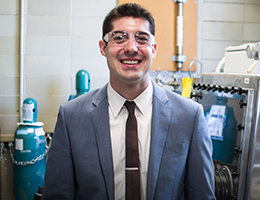Nicholas E. Thornburg
 Why did you choose Northwestern?
Why did you choose Northwestern?
Northwestern University was, admittedly, a slightly lower-ranked institution among the chemical engineering doctoral degree programs that I considered attending—but rankings are hardly a determinant in a graduate student's growth, success and overall satisfaction. I could immediately tell upon my recruiting visit to Northwestern that the Department of Chemical & Biological Engineering felt like a family: the graduate students were cohesive, social and aspirational, and the faculty and staff genuinely cared for their well-beings. The amazing rapport I quickly developed with my future Ph.D. advisor Professor Justin Notestein and the lack of a first-year qualifying exam (universally seen by the Department as an inappropriate assessment of one's research potential) were the primary reasons I proudly chose to enroll at Northwestern—a decision I will forever cherish!
How would you describe your research and/or work to a non-academic audience? What was it then and/or what it is now?
Chemical engineering is all about combining chemistry, calculus and economics to solve very important problems for consumers and for the environment. My doctorate at Northwestern focused on ways of making large-scale chemical manufacturing more sustainable. I sought to understand new chemical pathways that utilized environmentally benign starting molecules to create important commodity building blocks for a diverse range of consumer end-products. Now, in my role as a staff engineer at the National Renewable Energy Laboratory (NREL) in Golden, CO, I apply the same principles of green chemistry and chemical reaction engineering to improve the overall sustainability of the U.S. transportation sector—from synthesizing net-zero-carbon fuel molecules to mitigating vehicle emissions by land, sea and air.
Tell us who or what inspired your research and/or work.
I aspired to become a chemical engineer because of my high school chemistry teacher, Lisa Johnson. Lisa practiced chemical engineering for nearly two decades before pursuing a career in education, and her shrewd practicality and passion for chemistry instantly opened my eyes to the discipline. Ever since age 15, I knew I wanted to become a chemical engineer to harness the power of chemistry and math for the greater good. Studying sustainable chemical manufacturing during my doctorate at Northwestern and now sustainable transportation at NREL has been a dream come true for fulfilling my career's purpose.
What are you most proud of in your career to date?
I am most proud of my agility to dive into diverse research areas and applications while still holding onto my formal training from graduate school. Since graduating from Northwestern, I have worked on problems in biofuels, bio-based chemicals, hybrid biological-chemical systems, electrochemistry, internal combustion engine efficiency and vehicle emissions management. Many of these topic areas have little to do with the topic of my dissertation, but I have discovered unique ways of applying my expertise in heterogeneous catalysis and chemical reaction engineering to make impactful contributions in seemingly disconnected research fields. I take enormous pride in my ability to immerse myself in new research topics, drawing strength from my naïveté to help solve hard problems through a unique lens.
Tell us about a current achievement or something you're working on that excites you.
My latest fascination is with the molecule ammonia (chemical formula NH3), arguably the single most important chemical for sustaining human life on planet Earth—but one whose century-old manufacturing process has taken an astronomical toll on the environment. I'm currently working with an amazing, multidisciplinary group of NREL researchers to discover more sustainable ways of making ammonia, as well as utilizing it as a zero-carbon fuel and dense hydrogen (H2) carrier for sustainable transportation.
What advice would you give your younger self or someone considering a similar path?
Find something (or somethings) in your field that excites you beyond your own comprehension. Listen to your instincts when it comes time to make big career decisions, such as where to go to school or where and for whom to work, and don't be too 'scientific' about those choices. Balance your passions with self-care and time away from the lab—sometimes our most innovative ideas are conceived when we least expect it. Discover where your true compass points, and don't let the voices of criticism or dissent overpower the voice of your own intuition.